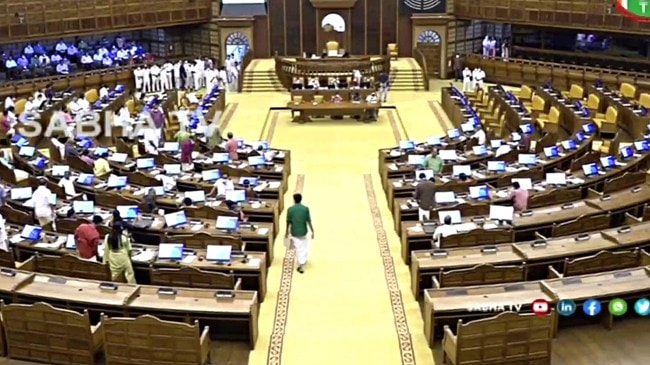Opinion Private universities needed for a better Kerala model
Presently, the higher education in the state is broken, in stark contrast to the situation of primary education. Kerala’s intellectuals, researchers and academics who do well exit early and find a place in national or international institutions
 The Kerala Legislative Assembly passed the Private Universities Bill, allowing for private universities in the state. (File Photo)
The Kerala Legislative Assembly passed the Private Universities Bill, allowing for private universities in the state. (File Photo) Malayalis have an educational spirit. From Bhutan to Ethiopia to almost every state in India, Malayali educators’ industriousness has cultivated institutions which were instrumental in taking education to millions. It is, therefore, ironic that Kerala has yet to fully embrace this spirit within its higher education sector. Stagnating state-run colleges and universities have turned away students who are forced to seek opportunities outside the state, contributing to a brain drain and a financial drain. The Kerala Migration Study 2023 estimated 2.5 lakh student emigrants from the state.
The Private Universities Bill that was passed in the Kerala assembly with bipartisan support has the potential to
In her work on Asian economies, Aihwa Ong shows how the creation of special “neoliberal zones” in certain spheres of the economy, rather than indiscriminate privatisation, has helped countries reap the benefits of privatisation. At its most apparent, this is exactly what the Private Universities Bill too seeks to do in Kerala — the opening up of a limited terrain to private capital, while retaining governmental quality controls. The Bill is not about unbridled privatisation; the state would retain its public universities while allowing private ones to compete with them.
Such a partial privatisation would work as a “nudge”, as Richard Thaler and Cass Sunstein might call it. Nudges seek to shape behaviour by designing environments and pathways that encourage certain behaviours. Presently, the higher education in the state is broken, in stark contrast to the situation of primary education. Kerala’s intellectuals, researchers and academics who do well are the ones who exit early and find a place in national or international institutions. This lag is most evident in the social sciences, and this was exemplified in the controversies around the doctoral theses of some notable personalities in the state.
One could argue that a “socialist nudge” is possible as opposed to the present attempt at a “neoliberal nudge”. In the absence of concrete proposals, it is better to seek inspiration from outside — in this case, from private capital — rather than wait for the academia in the state to revive itself. There are enough reasons to believe this nudge will work and that it will be ultimately beneficial to the state’s overall economic and cultural well-being.
The strongest supporting factors for a private university ecosystem in Kerala are its demographic diversity and its progressive atmosphere. A visit to any public university in Kerala will show that peer interaction with students from elsewhere in the nation and outside is badly missing at present. An equally important factor is the rich mercantile consciousness in the state, fuelled by the trading history and experiences of Kerala’s minorities. By shaping incentives within the domain of higher education, partial privatisation could exploit this skill. In fact, it offers a little incentive for everyone — profit motive for investors, a new terrain for native entrepreneurs to diversify into, job-creating infrastructural investment, competitive markets for existing academics, and employability-oriented education for new students.
There is also a historical precedent for such a move. In the early twentieth century, as caste discrimination and lack of infrastructure prevented a huge section of Kerala’s population from achieving even basic literacy, it was community-led education that created a revolution. Pure economic capital was not the driving force back then, but the enterprising spirit of the time expressed itself through a form of communal entrepreneurialism. Such “communalism” was considered a bad thing, and there were multiple efforts to suppress even the productive competition that was a part of it. The Left Democratic Front government, or the Congress-led United Democratic Front for that matter, have thankfully chosen not to repeat the same mistakes as Travancore did with “communalism”.
There are quite obvious possibilities of collateral damage, however. The state government will find it a challenge to instil an openness to institutional innovation in public universities while preventing them from being pulled into the vortex of market-games without social goals. Without this openness, public universities are bound to lose the inevitable competition with private universities and soon decay. While private universities can offer scholarships and often maintain a level of diversity among their students and faculty, their efforts cannot compare to the cheap, quality education that is possible in a public institution.
Finally, for those familiar with the history of the Left’s industrialisation push in West Bengal, such a “neoliberal turn” brings back the ghosts of Singur and Nandigram. However, the case with Kerala is different for three reasons. One, private universities can enrich Kerala’s service sector, tapping into the suitability of converting the ecologically fragile state into a weightless knowledge economy. Secondly, they can be instrumental in internationalising Kerala by making Kerala’s ageing economy a relatively cheap educational hub for the entire developing world. Thirdly, Kerala can cultivate, based on its social democratic spirit, private universities with a social consciousness.
Kerala may be a latecomer to private higher education, but it can still catch up because of these advantages. Most importantly, Kerala can imagine a new model of private universities and a better Kerala Model that is based on the state’s unique blending of communitarian entrepreneurialism and human-centric development — private universities with Kerala characteristics.
Kuriakose Mathew teaches politics and international relations at the School of Liberal Arts and Management Studies, P P Savani University, Surat. His research focuses on democratic forces in transitional polities. Arjun Ramachandran is a research scholar at the Department of Communication, University of Hyderabad.






